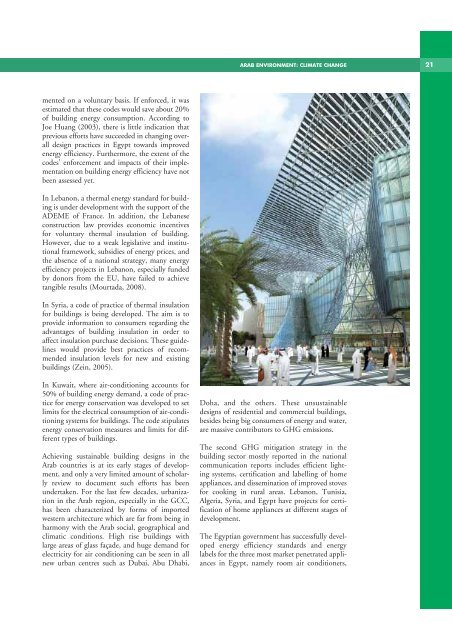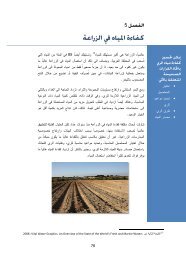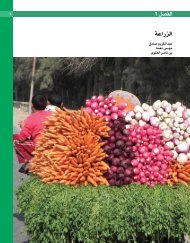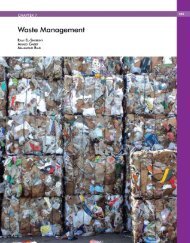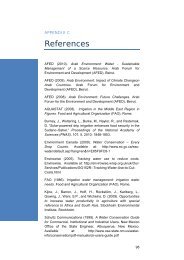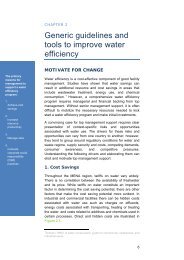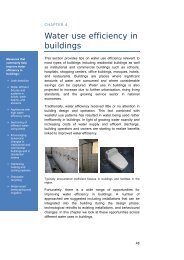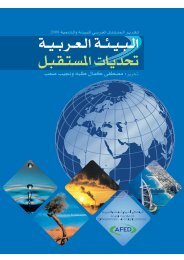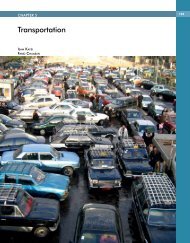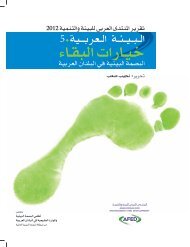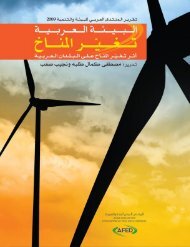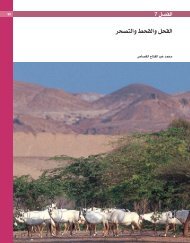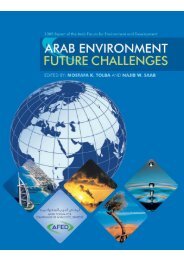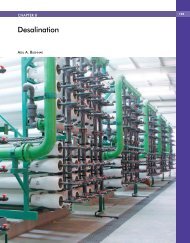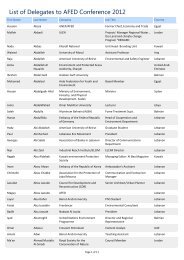Impact of Climate Change on Arab Countries - (IPCC) - Working ...
Impact of Climate Change on Arab Countries - (IPCC) - Working ...
Impact of Climate Change on Arab Countries - (IPCC) - Working ...
You also want an ePaper? Increase the reach of your titles
YUMPU automatically turns print PDFs into web optimized ePapers that Google loves.
ARAB ENVIRONMENT: CLIMATE CHANGE 21<br />
mented <strong>on</strong> a voluntary basis. If enforced, it was<br />
estimated that these codes would save about 20%<br />
<str<strong>on</strong>g>of</str<strong>on</strong>g> building energy c<strong>on</strong>sumpti<strong>on</strong>. According to<br />
Joe Huang (2003), there is little indicati<strong>on</strong> that<br />
previous efforts have succeeded in changing overall<br />
design practices in Egypt towards improved<br />
energy efficiency. Furthermore, the extent <str<strong>on</strong>g>of</str<strong>on</strong>g> the<br />
codes’ enforcement and impacts <str<strong>on</strong>g>of</str<strong>on</strong>g> their implementati<strong>on</strong><br />
<strong>on</strong> building energy efficiency have not<br />
been assessed yet.<br />
In Leban<strong>on</strong>, a thermal energy standard for building<br />
is under development with the support <str<strong>on</strong>g>of</str<strong>on</strong>g> the<br />
ADEME <str<strong>on</strong>g>of</str<strong>on</strong>g> France. In additi<strong>on</strong>, the Lebanese<br />
c<strong>on</strong>structi<strong>on</strong> law provides ec<strong>on</strong>omic incentives<br />
for voluntary thermal insulati<strong>on</strong> <str<strong>on</strong>g>of</str<strong>on</strong>g> building.<br />
However, due to a weak legislative and instituti<strong>on</strong>al<br />
framework, subsidies <str<strong>on</strong>g>of</str<strong>on</strong>g> energy prices, and<br />
the absence <str<strong>on</strong>g>of</str<strong>on</strong>g> a nati<strong>on</strong>al strategy, many energy<br />
efficiency projects in Leban<strong>on</strong>, especially funded<br />
by d<strong>on</strong>ors from the EU, have failed to achieve<br />
tangible results (Mourtada, 2008).<br />
In Syria, a code <str<strong>on</strong>g>of</str<strong>on</strong>g> practice <str<strong>on</strong>g>of</str<strong>on</strong>g> thermal insulati<strong>on</strong><br />
for buildings is being developed. The aim is to<br />
provide informati<strong>on</strong> to c<strong>on</strong>sumers regarding the<br />
advantages <str<strong>on</strong>g>of</str<strong>on</strong>g> building insulati<strong>on</strong> in order to<br />
affect insulati<strong>on</strong> purchase decisi<strong>on</strong>s. These guidelines<br />
would provide best practices <str<strong>on</strong>g>of</str<strong>on</strong>g> recommended<br />
insulati<strong>on</strong> levels for new and existing<br />
buildings (Zein, 2005).<br />
In Kuwait, where air-c<strong>on</strong>diti<strong>on</strong>ing accounts for<br />
50% <str<strong>on</strong>g>of</str<strong>on</strong>g> building energy demand, a code <str<strong>on</strong>g>of</str<strong>on</strong>g> practice<br />
for energy c<strong>on</strong>servati<strong>on</strong> was developed to set<br />
limits for the electrical c<strong>on</strong>sumpti<strong>on</strong> <str<strong>on</strong>g>of</str<strong>on</strong>g> air-c<strong>on</strong>diti<strong>on</strong>ing<br />
systems for buildings. The code stipulates<br />
energy c<strong>on</strong>servati<strong>on</strong> measures and limits for different<br />
types <str<strong>on</strong>g>of</str<strong>on</strong>g> buildings.<br />
Achieving sustainable building designs in the<br />
<strong>Arab</strong> countries is at its early stages <str<strong>on</strong>g>of</str<strong>on</strong>g> development,<br />
and <strong>on</strong>ly a very limited amount <str<strong>on</strong>g>of</str<strong>on</strong>g> scholarly<br />
review to document such efforts has been<br />
undertaken. For the last few decades, urbanizati<strong>on</strong><br />
in the <strong>Arab</strong> regi<strong>on</strong>, especially in the GCC,<br />
has been characterized by forms <str<strong>on</strong>g>of</str<strong>on</strong>g> imported<br />
western architecture which are far from being in<br />
harm<strong>on</strong>y with the <strong>Arab</strong> social, geographical and<br />
climatic c<strong>on</strong>diti<strong>on</strong>s. High rise buildings with<br />
large areas <str<strong>on</strong>g>of</str<strong>on</strong>g> glass façade, and huge demand for<br />
electricity for air c<strong>on</strong>diti<strong>on</strong>ing can be seen in all<br />
new urban centres such as Dubai, Abu Dhabi,<br />
Doha, and the others. These unsustainable<br />
designs <str<strong>on</strong>g>of</str<strong>on</strong>g> residential and commercial buildings,<br />
besides being big c<strong>on</strong>sumers <str<strong>on</strong>g>of</str<strong>on</strong>g> energy and water,<br />
are massive c<strong>on</strong>tributors to GHG emissi<strong>on</strong>s.<br />
The sec<strong>on</strong>d GHG mitigati<strong>on</strong> strategy in the<br />
building sector mostly reported in the nati<strong>on</strong>al<br />
communicati<strong>on</strong> reports includes efficient lighting<br />
systems, certificati<strong>on</strong> and labelling <str<strong>on</strong>g>of</str<strong>on</strong>g> home<br />
appliances, and disseminati<strong>on</strong> <str<strong>on</strong>g>of</str<strong>on</strong>g> improved stoves<br />
for cooking in rural areas. Leban<strong>on</strong>, Tunisia,<br />
Algeria, Syria, and Egypt have projects for certificati<strong>on</strong><br />
<str<strong>on</strong>g>of</str<strong>on</strong>g> home appliances at different stages <str<strong>on</strong>g>of</str<strong>on</strong>g><br />
development.<br />
The Egyptian government has successfully developed<br />
energy efficiency standards and energy<br />
labels for the three most market penetrated appliances<br />
in Egypt, namely room air c<strong>on</strong>diti<strong>on</strong>ers,


